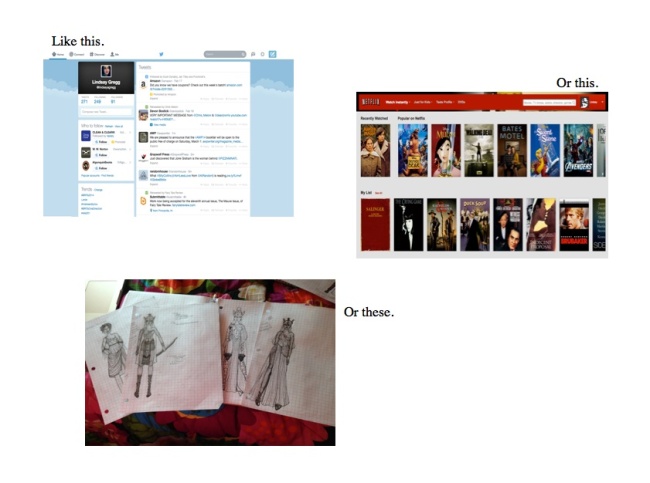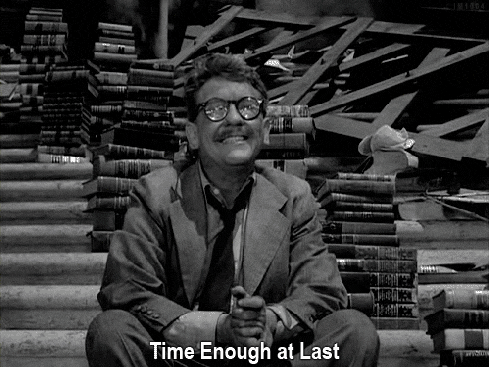Uncategorized
The Witch of Leper Cove by Deborah Bogen Book Review
StandardThe children must cope with being separated and learn how to survive as orphans. Alice teaches Lily her way of healing and friendship, especially with lepers. Wyllym has to learn to be independent of his brother and come into his own. Edric must choose between scholarship and family. Everything seems to be going well for Lily and her brothers until Alice is accused of witchcraft. Together the…
View original post 494 more words
English Student Daniel Brount discusses his experiences in Ball State’s Unified Media
StandardGetting Professional Pt. II: Résumés and Cover Letters
StandardSo, you have a job interview?
Good for you and best of luck to you, I mean it. But, if you want to leave with a job offer–from Costco to Merrill-Lynch–you’re going to need more than luck to make a good impression.
Sure, some of us are born lucky. We’re charismatic. Throw great parties. Make great first impressions. Write decent research papers hours before they’re due. Or you could be the work-horse. Graduated Magna Cum Laude. Perfect attendance. Completed multiple internships all while working three jobs and presiding over your sorority/fraternity and countless other student organizations. But…
How’s Your Résumé?
In order to impress potential employers you’re going to have to embody both the lucky one and the work-horse. Employers want to believe that you’re going to do good work for them, but they also want to make sure you aren’t a stuff-shirt.
Résumés that list your every accomplishment since Middle School are not only an incredible waste of paper, but are also quite obnoxious. Unless you’re interviewing to get into Juilliard or the symphony, no one cares that you were in high school band.
While you’re at it, nix that Objective statement and save that iteration for your Cover Letter.
Good résumés say hire me, I have experience in (add skill here) that is relevant to your company and this position. Gone are the days of printing mass quantities of your accomplishments and calling it a résumé. Employers want to see that you know a little about them so they know you’re invested.
And for goodness sake stand out. I don’t mean that your résumé should be totally avant-garde, but play with the font and colors a little and print it on nice paper. The key is effort and preparedness. Don’t forget to bring extra copies. Remember the Six Ps?
Prior
Planning
Prevents
P—
Poor
Performance
When in doubt, remember the Six Ps.
Craft a Creative Cover Letter
Your cover letter should give your employer an idea of who you are as a person and why he or she should even interview you. Like the previews before the movie.
Make it short, sweet, and professional.
That cover letter is kind of lame. Don’t be afraid to add your own creative flair so that your personality comes shining through.
Be sure to address the person who will be interviewing you in the cover letter and thank them for their consideration. Let them know that you look forward to meeting them and their staff. After all, it’s probably not a two-man operation.
The Key
The absolute keys to a good interview are: Preparedness and Effort. If you do your research–take notes, prepare questions–and put a genuine effort into preparing for your interview, you’ll feel less nervous and your interviewer will definitely take notice.
Hopefully you learned a little about résumés and cover letters, so, until next time. Thanks for reading!
Assembling a Professional Portfolio
StandardWriting Samples
As graduation grows nearer the scramble to find a “real job” has commenced or at the very least becomes an increasingly frightening realization. As English majors we are both limited and liberated by what we do. The ability to turn a phrase and meticulously edit pages upon pages of copy is both bankable and likely to rouse inherently condescending inquiry: “So, what can you do with a degree in English, teach?” Luckily for us, companies are realizing more and more the necessity for a mastery of the English language and the art of creative communication.
So, how can you show off your skills?
Being a long-time admirer of the Vera Bradley product line and commitment to philanthropy and their hometown of Ft. Wayne, Indiana it seemed obvious that I should submit my résumé. After receiving advice from a knowledgable career guide, I learned that I should also compile writing samples that both show off my skills, display a thorough research of the company and its needs, and explore ways of increasing Internet and Social Media traffic leading to increased sales.
Simply Put
I created four hypothetical blog posts for Vera Bradley’s blog The Inside Stitch that feature both their products and their annual factory sale.
Number One: Generating buzz
Are you ready for #vbos14?
This post describes twelves steps to preparing for the biggest event of the year for Vera Bradley. Under the dome of the Allen County War Memorial Coliseum in Ft. Wayne, Indiana thousands of women (and the unfortunate husbands they drag along) gather for the week-long event in hopes of scoring garbage bags full of good deals–a shopper’s Mecca. This post generates buzz for the sale by providing tips on how to navigate it successfully.
Number Two: Displaying product knowledge.
Style My Vera
This post involves showcasing new products in a blog feature. Describe new handbag styles and their usefulness, while promoting additional purchases of scarves and keychains to adorn them.
What’s in My Vera?
A post describing a given Vera Bradley bag and its effectiveness and usability.
Take aways
Your writing samples shouldn’t just highlight your writing competence and creativity. Your portfolio is like a job interview before a job interview and should display good research and keen interest in the company in which you’re applying. Maybe you aren’t thinking about applying to Vera Bradley or any place like it, but the principles remain the same. In the end, employers want to feel like you’ve done your homework and that you’re an employee worth investing in.
Published Authors on Being Published #InPrint14
StandardIn the spirit of technological innovation I am going to try mobile blogging—from my iPhone. Limited HTML knowledge don’t fail me now.
So, this week at Ball State is the annual In-Print Festival celebrating and probing three authors who have recently published their first books.
This year we had the pleasure of meeting T Fleischmann, Mario Alberto Zambrano, and Natalie Shapero to talk about their respective books and experiences.
We were also able to hear from someone on the other side of publishing, editor of Booth literary magazine out of Butler University, Robert Stapleton.
So, how do you go about getting yourself published?
If you’re T Fleischmann, author of Syzygy, Beauty you have a lot of voices in your head and need a place for them to go. After graduate school Fleischmann hitchhiked across the continental U.S. and admits that he would write even if being published wasn’t in the cards. For him, writing, speaking for the transgendered community is gratifying enough.
Mario Alberto Zambrano always knew he wanted to be a dancer and he was until age twenty-seven. After fifteen years he didn’t feel as passionate about a career in dance, so he went back to school where he found a passion for creative writing. It was while on tour performing Wicked in Osaka to pay for his tuition to The New School where he found his muse. A childhood game honoring his Mexican-American background—lotería. Lotería, 53 vignettes for the 53 lotería cards. The rest, as they say, is history.
Natalie Shapero is my hero. Could go on a bumper sticker right? Her candor and awesome prose inspires me to be better and at the same time feel better about not knowing exactly what to do. After completing her MFA and what she calls an unpublishable thesis, Natalie went to law school where she was able to overcome her hang-up on never writing too personally blaming her creative awakening on the environment of law school. After two years of sending around a manuscript we have No Object—a fascinating and frankly hilarious book of poetry that isn’t afraid to delve into real-life feels.
Advice?
TF: Find time to read and write things that you want to read and write.
Natalie Shapero exchanges poems with a friend every two weeks. “It just helps to keep writing.”
Getting published is hard, but we can increase our chances by writing every day and submitting our work. According to Robert Stapleton and affirmed by the writers, doing extensive research on literary magazines and finding which one is the best fit for your work is the best way to increase your odds.
The In-Print Festival is a great opportunity to meet some great people and hear writers speak candidly about the publishing biz. (It also happened to be a great place to score some free reads this year.)
I encourage everyone to participate in In-Print (back in 2015) and events like In-Print and tweet advice and information via #litcitizen and check out the Literary Citizenship blog.
If you would like to read a sampling of these authors’ works and the works of some other great writers and artists pick up a copy of The Broken Plate literary magazine at thebrokenplate.com.
Thanks for reading!
Beyond the Blog: Developing Your Online Presence as a Writer
StandardWe recently highlighted ways that some of you integrate Tumblr into your online routine and use this platform to complement your work on WordPress.com, which is your online hub. Since the internet is a very big playground, let’s talk about other ways to develop your web presence and personal brand strategically, as well as use WordPress.com to promote your writing in a way that makes sense for you.
View original post 1,051 more words
Three Ebooks to Spark Creativity and Grow Traffic
StandardAt WordPress.com our raison d’être is to do everything we can to help you make your blog the very best it can be. Over at The Daily Post we’ve got daily writing prompts to give your muse a friendly nudge, we publish articles on how to grow your traffic and community, as well as tips and advice on how to take great photos, no matter which gear you choose.
We’ve compiled a ton of great material into three new ebooks, made with love, for you. And, they’re free. They come in three fetching formats so we’ve got you covered no matter whether .pdf, .epub (iBooks), or .mobi (Kindle) is your jam.
365 Writing Prompts
So you want to write but you have trouble getting started? Writers’ block a perpetual, unwelcome guest? With 365 Writing Prompts we’ve got a different writing prompt to jumpstart your muse each and every…
View original post 194 more words
Enough Time to Make Hay While the Sun Shines
StandardEver feel like there’s just not enough time in a day?
If you answered “No” I envy you. Teach me. It seems like no matter how much time I have it’s not enough.
And it’s every day. The same cycle, like Inception or reverse Inception where twenty-four hours seems more like four.
And me without my totem wonders–is this real life? There are just so many distractions
that it becomes next to impossible to accomplish anything. I read an article on The Urban Muse where Susan Johnston describes ten time management methods tailored for writers. So, I started strategizing and since have tried the following:
1. Making Lists
I love lists. Making lists. Reading lists. Using lists is where things get tricky. I make a lot of lists. I mean a lot. It’s really hard to stick to lists when you’re always misplacing them. So, I’m currently looking for a better way to keep lists.
2. Using Timers
This is actually pretty effective. Set timers at fifteen-minute intervals (or 30 or an hour dealer’s choice really) and commit to tasks for the set amount of time, then take a break for the same or less amount of time. This method really breaks up big tasks so that they don’t seem so daunting to approach and I don’t find myself too distracted when I can look forward to a break.
3. Calendars
I’ve found using iCal and Google Calendar has been pretty useful. I can map out tasks for an entire day, week, month or year so that I can stay on top of appointments, assignments, meetings, etc. I can also parse out time throughout the day for me-time, errands, and writing time.
I feel like the old man in that episode of the Twilight Zone, but made for this era—I’m great at finding time for distractions, but there’s not enough time for what needs to be done. So, how do you manage your time? Have you tried any of the above methods? Have they been effective for you? If you have any effective advice on time management let me know in the comments so I can be Meredith Burgess (hopefully without the apocalypse).
Until next time, thanks for stopping by!
So you have a manuscript? Now publish it.
StandardThis week in Literary Citizenship we’re talking about publishing. The publishing world is like a giant game of Blackjack. It’s really a game of luck, but you can increase your chances of winning with certain skills and know-how.
Many editors have cashed-in on the secret to being published. Styles vary, but the advice is consistent across the board.
A Catchy Title and the Perfect Pitch
You’ll need both of these things not only to get published, but also to catch an agent. Your pitch should consist the nuts and bolts of your story and why it should be published. Something that is very important to the big publishers is money: is this book going to sell? “Who is this book for?” and “Which bestsellers is it similar to?” are questions you need to be prepared for.
Hit or Stay?
I’ve been reading Betsy Lerner’s book The Forest for the Trees, an invaluable resource for writers who want to be published. In chapters nine and ten Lerner, a book editor, contrasts what editors want with what authors want. There is a thickly drawn line as to whose opinion is more important in getting published, but what you as the author have to decide is what is more important to you: changing a major plotline to make them happy or keeping your integrity and moving on.
Doubling-Down
The publishing industry is a dog-eat-dog world, so it’s important to know what you’re getting yourself into. It’s important to know that getting published by one of the Big Six publishing houses (think Penguin) is next to impossible, but don’t fret there are other ways of getting your book published. See Jane Friedman’s guide to getting published “Understand the Key Book Publishing Paths” (pictured).
Get out there!
There are many valuable resources when it comes to publishing that make it easier to get to know the industry and get your book out there. See: Eckstutt and Sherry’s The Essential Guide to Getting Your Book Published, Marek’s Editors on Editing, Lerner’s The Forest for the Trees, or one of the other handfuls of books out there on the subject. The best advice I have heard, though, is networking. In publishing it’s all about who you know, so get on Twitter, build a blog, sell short stories to magazines, do whatever it takes to get your name out there.
Until next time,
Lindsay















